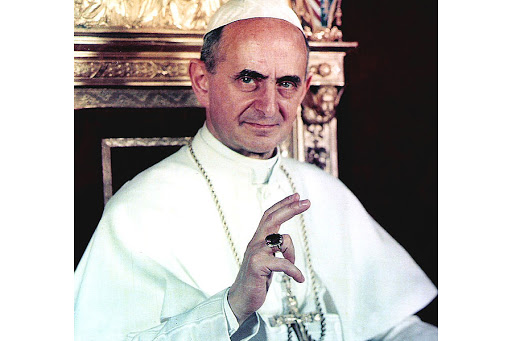Forty-six years ago last week, Pope Paul VI threw a monkey wrench into the machinery of the sexual revolution, which had created an expectation of doctrinal change in the minds of many Catholics.
In the face of mounting pressure to keep up with the times, he issued the Catholic Church’s official response in 1968: Humanae Vitae. That document reaffirmed the traditional condemnation of artificial birth control. It consequently ignited controversy across the globe and elicited widespread dissent.
Today, however, Humanae Vitae’s values are being taken more seriously by a new generation of young Catholics who came of age under Pope John Paul II. Just prior to my own priestly ordination, for example, I was required to sign an oath of fidelity he composed, promising at the very least to “adhere with religious submission of will and intellect to the teachings” of the Catholic Church.
When I took that oath, I knew that John Paul II had presented an influential series of 130 lectures on human sexuality — interrupted only by his assassination attempt in St. Peter’s Square — entitled "The Theology of the Body."
He used those addresses to boldly develop the themes presented in Humanae Vitae. But he situated them in their proper biblical context, and he drew on his own pastoral experience and philosophical expertise. His biographer called these reflections “a theological time-bomb set to go off with dramatic consequences.”
His lectures explored the meaning of our embodiedness — as well as the differentiation and complementarity between men and women — which he saw as being integral to our personhood, rather than merely extrinsic.
He proposed certain moral truths built into the structure of the human experience. For example, self-giving — not self-assertion — engenders authentic human flourishing. That spiritual truth is expressed by the human body in the total, mutual self-donation of sexual love. In fact, sexual expression speaks its own language, which contraception denies by arbitrarily manipulating the procreative potential of the sexual embrace.
John Paul II also reaffirmed Humanae Vitae’s call for “responsible parenthood,” acknowledging that every couple must determine for themselves the number of children they are able to raise well. In other words, prudently building a family precludes abandoning oneself to biological determinism.
And so, even though both popes rejected contraception, they recommended what Catholics call “natural family planning.”
The distinction between these two approaches lies in the fact that the human body is not merely fertile but rhythmic. Natural family planning allows those who practice it to remain open to life, even while it provides for the regulation of birth. Unlike contraception, which stifles nature, natural family planning cooperates with it. That is, nothing is done to alter the sex act itself, so as to render infertile that which is, in principle, fertile by divine design.
Admittedly, this natural approach requires discipline, which is difficult. But experience confirms that such difficulties often redound to the benefit of communication, cooperation, and strength of will.
That’s why I refer couples to Marquette University’s Institute for Natural Family Planning in the School of Nursing. They’ve developed their own method — the Marquette Model — that achieves a 98 percent effectiveness rate.
Most couples are responsive to that referral, but some people think a priest should keep quiet because he isn’t married. Of course, I haven’t experienced a marriage of my own from the inside out. But I am invited to encounter many marriages — from a privileged point of view, as a counselor and confessor — in the trusted way that only a celibate priest can.
Paul VI met the same sort of contempt. Perhaps that’s why his warnings went unheeded. In hindsight, they were ignored at society’s collective expense.
He warned that severing sex from fertility, disconnecting passion from responsibility, would make it easier to rationalize sexual immorality. At that time, things like fornication, adultery, and pregnancy outside of marriage deviated from the norm. Today, they are comparatively normal.
He also believed the instrumentalization of sex would make it easier for men to treat women like objects. In our day, the proliferation of internet pornography is but one symptom of that dominant, disordered tendency.
The Pope foresaw that, if the world came to see contraception as morally neutral, then keeping it from becoming a tool of the state would be far more difficult. Indeed, across the globe, programs for the elimination of poverty often amount to plans for eliminating poor people.
Finally, the Pope cautioned that contraception would habituate humanity to unlimited, intrusive control over the human body. In reality, almost 25 years after Humanae Vitae the U.S. Supreme Court decreed these chilling words: For two decades, people have “organized intimate relationships and made choices… in reliance on the availability of abortion in the event that contraception should fail.”
Even though he was right, Paul VI was widely denounced. He would never again write another encyclical. Later, he would say, “Modern man listens more willingly to witnesses than to teachers, and if he does listen to teachers, it is because they are witnesses.”
St. John Paul II’s personal example undoubtedly influenced the reception of his "Theology of the Body." His witness inspired young couples and emboldened new priests.
But Paul VI was also a deeply pastoral man who took a principled stand at his own personal expense.
That must have contributed, at least in part, to Pope Francis’s recent decision to beatify him, putting him one step away from official sainthood. Eventually, Pope Paul VI will be raised to the honors of the altar because he was much more than a teacher. He was also a witness who defended human dignity against a tidal wave of moral decline.
That is to say, he was what some people might call a prophet.
Rev. Joseph J. Shimek, S.T.L., J.D.works in the office of Archbishop Jerome E. Listecki of Milwaukee.

